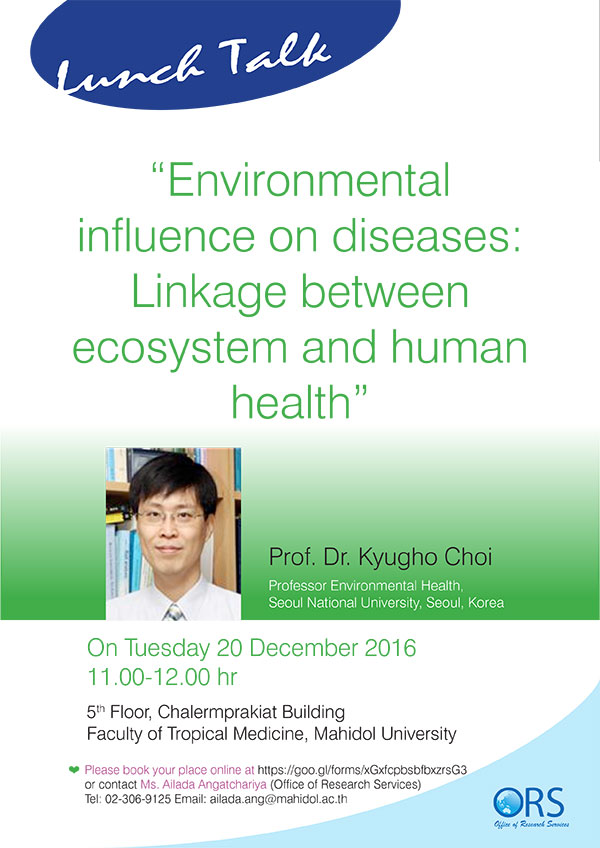On December 20, 2016 at 11.00-12.00 hr.

Environmental influence on diseases: Linkage between ecosystem and human health
On 20th December 2016, Professor Kyungho Choi conducted a lunch talk titled, “Environmental influence on diseases: Linkage between ecosystem and human health”. Prof. Choi has an academic post in Seoul National University (SNU) and he is also a researcher in the Asian Institute for Energy, Environment, and Sustainability (AIEES). AIEES is a public institute based in SNU that enhances collaboration in multidisciplinary researches, network, and University’s social stewardship.
In the beginning of Prof. Choi’s talk, a picture of a humidifier was shown in his presentation. He later explained the relevance of a humidifier in his topic. In Korea and other countries, humidifier is widely used primarily in winter as it adds moisture to the air to prevent dryness.
Following the extensive usage of humidifiers, numerous products of humidifier disinfectants have emerged in the market, particularly in South Korea. Humidifier disinfectants are used to neutralize the humidifier water. In their advertisements, they claim that these disinfectants are safe for human health, even for the infants. However, a report regarding the effects of these disinfectants pronounced otherwise.
There are 4,261 reported cases, 853 reported casualties, and 228+ official number of victims in relation of exposure to humidifier disinfectants. One of the diseases recorded was lung injury. The cause of this was the chemicals used in making disinfectants such as chloride and phosphate, among others.
Prof. Choi introduced chemicals that can be found in things we are exposed to daily. One of those was ‘Bisphenol A’. This is a chemical that was used in creating things like receipt, money, toys, and plastic lunch boxes, things that we get in our hands often. Our health can be affected by everyday chemicals from ecosystem receptors, industry wastes, and consumer products. In a study, they found an upsurge on some diseases like hypospadias and autism. There was also a negative impact in the environment as Bisphenol S affects fish reproductions.
Presently, environmental health scientists are observant to find bad chemicals. They are on a task to identify chemicals with causal association with adverse health effects, and assist in using safer chemicals.
Prof. Choi concluded that chemicals are important determinant of health and more helps warranted for developing safer substitutes. He also mentioned that identifying major chemicals of health concern is important first step to welcome associations’ studies and chemical management.
We thank Prof. Choi for a very informative talk and for providing us an insight on how these chemicals we are exposed to every day can affect human health and the ecosystem as a whole. We look forward to meeting Prof. Choi again and share with us his knowledge about environmental health.